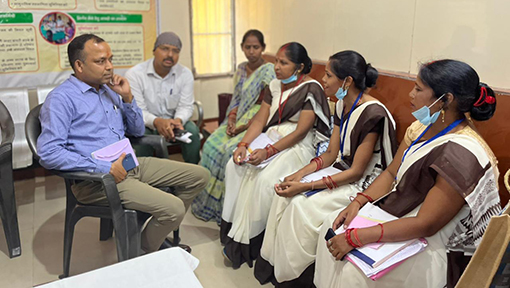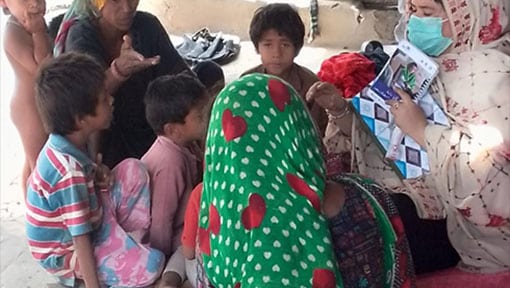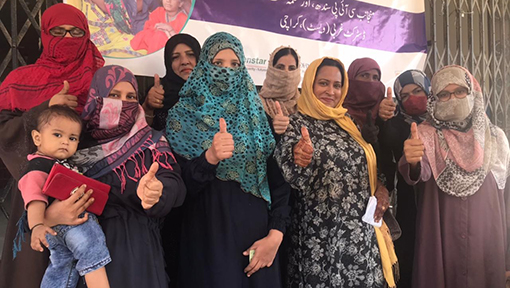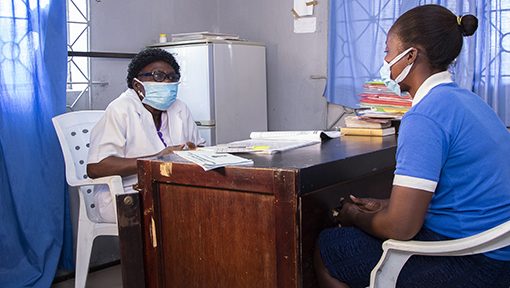Officials from Newest TCI State of Bihar Learn from Two TCI Model Cities – Lucknow and Agra
Contributors: Deepika Anshu Bara, Parul Saxena, Manish Saxena, Nitin Dwivedi, Vivek Malviya, Samarendra Behera and Hitesh Sahni

Bihar state government officials visiting a UPHC in Lucknow.
The Challenge Initiative’s (TCI’s) goal is to build resilient health systems by transferring capacity to local governments so that high-impact family planning (FP) and adolescent and youth sexual and reproductive health (AYSRH) interventions are sustained after a city’s engagement ends with TCI. TCI accomplishes this through a coaching methodology that coaches and mentors local governments in the implementation of these interventions. To build resilient systems, TCI India enlists the help of high-performing graduated cities – such as Lucknow and Agra in Uttar Pradesh (UP) – that received TCI support to become self-reliant, to start up new TCI states such as Bihar.
TCI’s successful coaching model sparked interest from senior state officials from the Bihar government, who requested a visit to these two UP cities to learn from their experience. The learning visit helped the State Health Society (SHS) of Bihar – which included the National Urban Health Mission’s (NUMH’s) State Program Manager, Deputy Director of FP, and the NUHM State Finance Manager from SHS Patna – to quickly accelerate their start-up process before the state begins efficiently and effectively scaling TCI interventions in seven cities.
Over the course of the two-day visit in May 2022, the Bihar team held deep dive discussions with the Joint Director, Family Welfare (Directorate, Govt. of UP) Chief Medical Officer (CMO), National Health Mission Family Planning (NHM – FP) team, District Program Manager, Additional CMO of FP, Medical Officer-In-Charge (MOIC), staff nurse, Auxiliary Nurse Midwife (ANMs) and Accredited Social Health Activist (ASHAs) in both cities to better understand the TCI program, its interventions – most of which closely align with the global High-Impact Family Planning Practices or “HIPs” – and how to achieve and sustain meaningful results.

Learning from Lucknow’s urban ASHAs.
The Bihar team was coached by TCI master coaches and other local government staff in Lucknow and Agra, who shared their experience and knowledge about implementation and the importance of public-private partnerships for better fixed day static (FDS) service delivery. They also heard how TCI empowered urban primary health centers (UPHCs) to significantly contribute to the urban family planning program through MOIC and urban staff nurse trainings on newer contraceptive methods (i.e., Antara and Chhaya) and IUCD insertion. Other expertise shared included the importance of data review and monitoring of urban indicators by first strengthening the capacity of ASHAs to prioritize potential couples by age and method user/non-user through use of the 2BY2 matrix tool.
During discussions with UP state government officials, the Additional CMO of FP from Lucknow explained how the evidence-based interventions introduced by TCI led to observable quantitative and qualitative changes in family planning in urban Lucknow.
A NMH-FP official in UP also shared what he saw as the most significant changes as a result of engagement with TCI:
TCI India, with their technical support, coached government officials at the state and the city level to strengthen the urban FP program, and tremendous achievements have already been seen. First, UP embraced FDS. Initially, PIP funding were available for FDS at UPHCs in 20 TCI India demonstration cities. Later, the state government expanded FDS as ‘Antral Diwas’ in over 75 districts, where the PIP funds are granted for quarterly meetings and orientations of ASHAs and ANMs. Secondly, the state government endorsed the evidence-based interventions and shared them with city officials for implementation.”
The Bihar team is now reviewing these learnings as it prepares to roll out the TCI India model in the state by investing resources to implement TCI’s interventions and improve family planning access and urban health for better results and sustainability.






